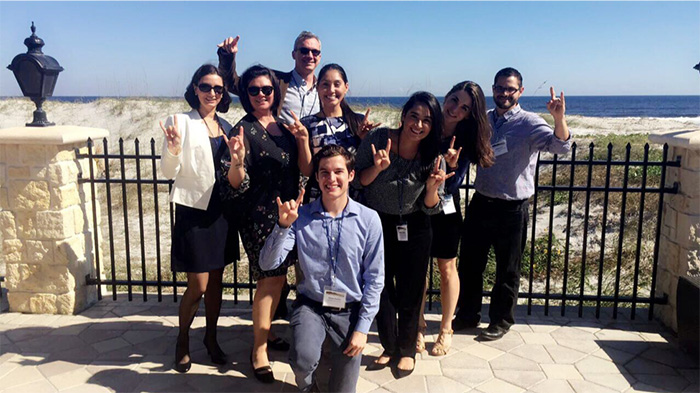
Above: Dr. Jay Michaels (far back) and Dr. Anthony Coy (far right) with USF Sarasota-Manatee campus undergraduates at the annual Southeastern Society of Social Psychologists Conference from 2017. From left, middle, Stefania Warren, Julia Smirnov, Adriana Villar, Adriana Gaffey, and Samantha Boddy. Carlo Santos is at front.
Psychology students typically learn about research methods and statistics through their coursework, but in Dr. Jay Michaels’ Social Dynamics Lab at the University of South Florida’s (USF) Sarasota-Manatee campus, undergraduate research assistants apply what they know about these topics to contribute to cutting-edge research. Dr. Michaels, an Assistant Professor of Psychology, recently produced two new peer-reviewed articles, each of which includes current or recent USF undergraduate students as co-authors. The articles all present new findings about the psychology of religion.
The first article, titled “Are Religious Americans Less Concerned About the Environment? An Analysis of the 2016 United States General Social Survey,” appeared in Environmental Politics (July, 2020). In this article, Michaels collaborated with USF Assistant Professor of Sociology Dr. Feng Hao, recent USF graduate Julia Smirnov, and current USF undergraduate Ishan Kulkarni to analyze data from the General Social Survey to test a social psychology inspired theory about why religious Americans exhibit heightened interest in the environment despite having diminished concern about environmental dangers, like climate change.
The research team found that while religious Americans are not as concerned about environmental dangers, they are in fact more interested in the environment as a whole. This finding fits with the theoretical idea that religion affords people a sense of safety and security, which diminishes their sense of threat from uncontrollable events, like climate change. Furthermore, the heightened environmental interest seems to align well with the premise that Judeo-Christian traditions often emphasize how the faithful should revere the natural world as God’s creation. These findings help reconcile conflicting results from previous research and establish a new theory, by which researchers can examine environmental attitudes in the United States.
In a more recent publication appearing in Psychology of Religion and Spirituality titled, “What Are the Core Features and Dimensions of ‘Spirituality?’ Results from a Prototype Analysis of How Laypeople Mentally Represent Spirituality as a Concept”, Michaels and recent graduate Carlos Santos worked to understand how people typically understand spirituality. The research developed out of Santos’ honor’s thesis and addressed how scholarship had never before examined how people naturally think about spirituality. Without knowing how people naturally understand spirituality as a concept, it is not possible to determine if scholarship about this topic have used good operational definitions.
After conducting a multi-part study, Santos and Michaels were able to identify that people from 23 different countries share a common understanding of spirituality. Specifically, they think of spirituality as being linked to oneself and values, providing a set of religious beliefs, providing an existential connection and life force, relating to transcendence, and contributing to meaning in life. These findings align well with the broader scholarship and validate key ideas from decades of psychology of religion research.
Michaels is continuing to work with motivated USF undergraduate students in his lab during the Fall 2020 semester. Although the lab team is working remotely due to COVID-19, Michaels expects many more exciting breakthroughs to emerge from his ongoing research. There is no doubt his students will be instrumental in contributing to these future findings.
Note: Julia Smirnov is presently completing a master’s degree at Nova Southeastern University. Carlos Santos is currently finishing a master’s degree at Wake Forest University.